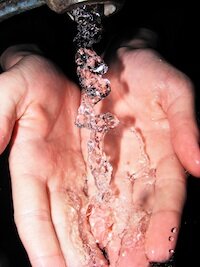Dear Ryan Murphy, We Don’t Need to Be Fixed: Glee and OCD

At first, I was very excited by the thought of a new character with Obsessive Compulsive Disorder on TV, especially on a show as popular as Glee. Surely, this will turn out well, I thought. Not so much. Emma Pillsbury, guidance counselor at William McKinley High School, has pretty serious OCD. She is shown in one episode wearing gloves and cleaning each individual grape in her lunch, and there are several times at which it becomes clear that sex is impossible because of the OCD. (She heads up the Celibacy Club and touts celibacy as a great alternative for those “afraid of the trouser snake.”) She cleans the counter in the teacher’s lounge with a toothbrush, etc. For the most part, I can at least be happy that it is shown as a serious disorder and not just some joke as on other shows (see Monica in Friends and Jerry on Seinfeld). However, as always, the entertainment industry has yet to get it right.
Despite the many portrayals to the contrary, OCD is not just compulsive rituals such as hand washing and scrubbing counters and counting, well, everything. The anxiety and obsessive thoughts are most often the worst parts of the disorder, and the actions are simply us trying our hardest to make their brain shut up. However, because they do not or cannot make the effort to portray the anxiety problem, the now iconic symptoms must suffice. I understand that visually displaying the anxiety might be much more difficult in a visual medium than just having them count every blessed thing in sight, but it would be nice if they would at least try a little harder. That being said, Emma’s symptoms are not unusual for someone with severe OCD. They are actually things that people do, but they are not the disorder. In addition to falsely casting the actions as the sum total of problems, this creates another issue. People who do not have OCD but who are simply very clean (“neat freaks”) take the term for themselves, as in “I’m so OCD about my dishes/laundry/etc.” This may not seem like much, but it ultimately makes the disorder seem like a joke in the eyes of those who are not truly familiar with it. Sufferers are seen as being overly dramatic about how severely it affects their lives and how much distress it can cause. After all, you’re just cleaning a lot, right?
The other issue I have with Emma as our poster girl is that she is constantly seen and portrayed as a broken thing. Now, let me be clear: I do not enjoy my disorder. It is not fun, an adventure, or awesome in any way. I joke and say it’s a blessing and a curse, but of course, given the choice, I can’t say I would keep it. I identify as someone with a mental health problem, even a disability. That being said, I do not think that the general populous needs anymore incentive to see us as broken. It is not helpful for those we love to try and play “let’s fix the crazy.” My wife has said that she would love to be able to help me, in that she would like to see me not freaking out and causing myself serious anxiety, etc. This is different from how Will is seen interacting with Emma in a lot of ways. Yes, the underlying assumption should be that he wants to help because he loves her and does not want to see her hurting. However, this is sort of smashed to bits in the scene where they use the song “Fix You.” The phrase has been used often in regards to mental health issues, and it never ceases to be offensive to me. I am not a lamp you have to glue back together or a transmission that has quit. I am a person, albeit a person with some misfiring neurons, but a person nonetheless. Things need fixing. People need helping and understanding.

Great entry. I think glee is like training wheels or something for these issues to get onto tv in a serious way, in a way the station will allow, in a way that makes people just comfortable enough watching so they don’t have to think too hard when it’s over. Champion of LGGG rights, fat “pride” intermixed with loads of fat jokes, self hating lesbians and bisexuals, two out lesbians playing straight women (though I did like the gender play with Bieste), and, as you have written here, ignorance of mental health while sort of bringing attn to it as a serious issue. Part of me is happy to see this stuff on screen but part of me thinks if you’re gonna do it, you gotta do it right. Who knows, maybe they are just showing how shallow and abusive high school is. That would be right on I guess…
Thanks! And you may be right, but I definitely think they could do better. I think I would be more charitable about it if every other representation wasn’t almost exactly the same. It’s just so disappointing.